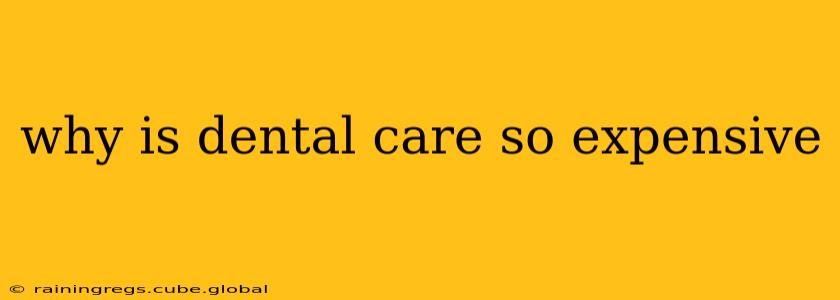Dental care costs can be surprisingly high, leaving many people wondering why maintaining good oral hygiene comes with such a hefty price tag. The expense isn't simply a matter of dentists charging exorbitant fees; it's a complex issue stemming from several interconnected factors. This article will delve into the reasons behind the high cost of dental care, examining everything from education and technology to insurance coverage and the overall structure of the dental industry.
What are the Major Factors Contributing to High Dental Costs?
Several key elements contribute to the high cost of dental procedures and services. Let's break them down:
1. The High Cost of Dental Education and Training
Becoming a dentist requires years of rigorous education and training, including undergraduate studies, dental school, and often specialized residencies. This lengthy and intensive educational process is expensive, both for the aspiring dentist and for the institutions providing the education. These high educational costs are ultimately passed on to the patients in the form of higher fees.
2. Advanced Technology and Equipment
Modern dental practices utilize sophisticated technology and equipment, from advanced imaging systems (like digital X-rays and CBCT scans) to laser dentistry and CAD/CAM technology for creating restorations. This technology, while improving the quality of care, significantly increases the practice's overhead costs, impacting the price of services.
3. The Business Model of Dental Practices
Many dental practices are privately owned businesses, operating with the goal of profitability. This business model often translates to higher fees to cover expenses, salaries, marketing, and other operational costs. Unlike some healthcare systems, the dental field isn't heavily subsidized by government funding in many countries, leading to a greater reliance on patient payments.
4. The Lack of Comprehensive Dental Insurance Coverage
Unlike medical insurance, dental insurance often has limitations on coverage, high deductibles, and co-pays. Many plans don't cover preventative care adequately, encouraging patients to delay necessary treatments until issues become more severe and expensive to address. This fragmented insurance system contributes to the overall perceived high cost of dental care.
5. Specialized Procedures and Materials
Certain dental procedures, such as implant surgery, orthodontics (braces), and complex restorative work, involve specialized skills, materials, and extended treatment times. These factors naturally lead to higher costs compared to routine cleanings and examinations. The materials themselves, like high-quality crowns or advanced composite resins, can also be expensive.
Why are dental insurance premiums so high?
The high cost of dental insurance premiums is directly linked to the high cost of dental procedures. Insurance companies must balance their premiums with the potential claims they'll have to pay out. When dental care is expensive, the insurance premiums needed to cover those costs also increase. Furthermore, the administrative costs associated with processing claims and managing insurance plans also add to the overall premium.
How can I make dental care more affordable?
While dental care can be expensive, there are strategies you can employ to make it more affordable:
- Regular preventative care: Preventative care, such as regular checkups and cleanings, is crucial for catching potential problems early and avoiding more extensive (and costly) procedures later.
- Negotiate payment plans: Discuss payment options with your dentist. Many practices offer payment plans or financing options to help manage costs.
- Shop around for dentists: Compare prices and services offered by different dental practices in your area.
- Consider dental savings plans: These plans often provide discounts on dental services without the restrictions of traditional insurance.
- Explore public health options: Depending on your location and eligibility, there might be publicly funded dental programs or community clinics that offer reduced-cost services.
Understanding the multifaceted nature of dental costs allows patients to be more informed consumers and advocates for themselves. By understanding the factors at play, you can make more informed decisions about your oral health and find ways to manage the associated expenses.
